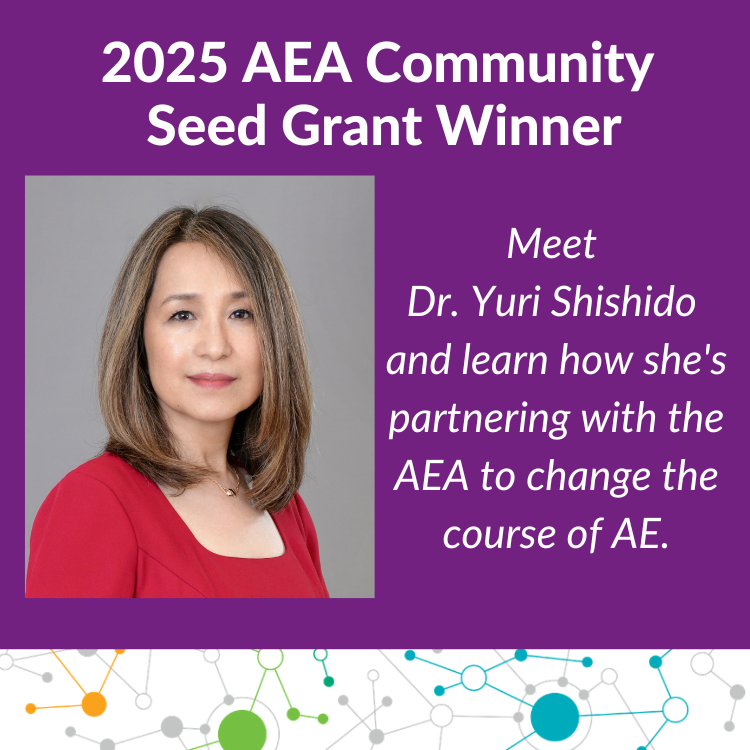Meet Dr. Yuri Shisido
August 8, 2025

Dr. Yuri Shisido (Emory University, Atlanta, Georgia, USA) was awarded a 2025 AEA Community Seed Grant for the investigation of Patient-Centered Assessment of Everyday Cognitive Function in Children with Pediatric Anti- NMDA Receptor Encephalitis with Novel MRI Biomarkers. Learn more about her research and how it will impact those affected with autoimmune encephalitis. The start date for the award is July 1, 2025.
You have been awarded an AEA Community Seed Grant, can you tell us more about the study you plan to do?
This project focuses on transforming the assessment and understanding of neurocognitive care in children with anti-NMDA receptor encephalitis (NMDARE), a condition that often results in persistent deficits in executive function and memory. These cognitive challenges can significantly affect a child’s ability to learn and navigate daily life.
Our research is built on an innovative approach that integrates patient-reported outcomes with advanced MRI biomarkers. We are utilizing patient-centered outcome measures to capture the real-world experiences of children and families. By gathering insights directly from the families, we hope to provide a more holistic and accurate picture of cognitive challenges in children with MNDARE. We are also leveraging cutting-edge MRI biomarkers to delve deeper into the brain’s structure and function. These advanced imaging techniques enable us to detect subtle changes in brain structure and function that might be overlooked by conventional MRI methods. Our goal is to identify specific alternations in gray and white matter volumes and white matter connectivity, especially in regions like the prefrontal cortex and hippocampus, which play critical roles in executive function and memory. Insights gained from this MRI analysis, coupled with improved neurocognitive assessments, will help elucidate the brain mechanisms underlying cognitive challenges faced by the population.
How will your study help patients and families affected by AE?
Pediatric autoimmune encephalitis (pAE) is a growing child health concern, now more common than infections encephalitis. While many children recover from neuropsychiatric symptoms, over 30% continue to experience persistent neurocognitive challenges, which can greatly impact their ability to learn and function in daily life. Unfortunately, current clinical care practices often fall short in supporting cognitive recovery and development necessary for children with pAE.
Our study aims to address these critical needs by combining patient-reported outcomes with advanced MRI analysis. By focusing on the real-word experiences of children and their families, alongside cutting-edge imaging techniques, we hope to enhance current assessment methods and pave the way for more effective and personalized intervention for pAE. Our goals are to identify risk factors early, allowing for timely intervention, improve the accuracy of neurocognitive assessments by integrating patient perspectives, and use innovative MRI biomarkers to uncover the brain mechanisms driving these cognitive challenges. Together, these efforts aim to create a framework that helps identify children at risk, determine who will benefit most from interventions, and inform future intervention strategies.
Ultimately, our research seeks to transform cognitive care for children with Autoimmune Encephalitis. With your generous support, we are poised to make significant advancements in AE research. This study not only addresses current gaps in assessment methods but also lays the groundwork for future cognitive intervention research, to improve long-term outcomes for children and families in the AE community.
Tell us more about yourself and your affiliation.
I am a Board-certified neuropsychologist at Children’s Healthcare of Atlanta (CHOA) and an Associate Professor of Pediatrics in the Division of Neurology at Emory University School of Medicine, in Atlanta, GA. I hold a PhD in Clinical Psychology from Georgia State University and completed specialized pediatric neuropsychology training at the UCLA Semel Institute and Kennedy Krieger Institute/Johns Hopkins University School of Medicine.
My professional mission is centered on improving neurocognitive outcomes for youth with complex medical conditions. In my clinical practice, I specialize in neuropsychological assessments of pediatric patients with neuroimmunology and cardiovascular conditions, conducting evaluations both during the sub-acute phase and longitudinally. By seamlessly integrating clinical service, research, and informatics, I strive to improve diagnostic precision, enhance prognostic implications, and tailer treatment and educational strategies and planning.
My research seeks to identify key predictors and mechanisms that shape neurocognitive outcomes by examining the dynamic interplay among cognitive performance, biological factors such as advanced MRI biomarkers, and contextual influences like caregiver involvement. Through close collaboration with a multidisciplinary team at CHOA and Emory, I seek to advance methodological approaches by refining cognitive assessments to better capture everyday functioning and improve measurement accuracy. In parallel, I am leading initiatives that leverage artificial intelligence and electronic medical records to enhance clinical care and optimize the efficiency and quality of research data collection and analysis.
I am deeply grateful to the AEA foundation and community for this distinguished award. I am especially thankful to the AE friends and families for their generous donations, which empower my research to make meaningful contributions toward advancing neurocognitive care in the AE community.
Thank you to the entire AE Alliance community for the commitment to changing the course of AE. Thank you to the researchers applying for the AEA Community Seed Grant program and to the AE Alliance community, friends and family members for donating to the AEA Research Network. It is your donations that allow us to fund research focused on improving the lives of people living with AE.
Together, we are changing the course of AE.